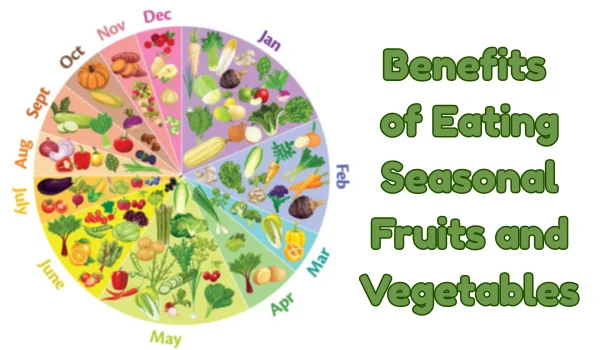In today’s fast-paced world, it’s easy to grab fruits and vegetables that are available year-round at supermarkets. But have you ever noticed how fresh, juicy mangoes in summer or crisp carrots in winter taste so much better than their off-season versions? That’s because seasonal produce is fresher, more nutritious, and better for both your health and the planet.
Eating with the seasons isn’t just a traditional habit — it’s a smart, natural way to nourish your body with the nutrients it needs at the right time of year. In this article, we’ll explore the benefits of eating seasonal fruits and vegetables, practical tips to include them in your diet, and answers to some common questions about seasonal eating.
🌿 What Are Seasonal Fruits and Vegetables?
Seasonal fruits and vegetables are those that grow naturally and are harvested during a specific time of the year in your region. For example:
- Summer: Mangoes, watermelon, cucumber, tomatoes.
- Winter: Carrots, oranges, spinach, sweet potatoes.
- Monsoon: Corn, gourds, berries.
These foods are fresher, tastier, and more nutrient-dense because they are picked at their natural ripeness — not stored or transported for months like off-season produce.
🍎 Key Health Benefits of Eating Seasonal Fruits and Vegetables

- Higher Nutritional Value
Seasonal produce is rich in vitamins and minerals because it’s harvested at its natural peak. For instance, citrus fruits in winter are packed with vitamin C, which helps strengthen your immunity when you’re most likely to catch a cold.
- Better Taste and Freshness
Nothing beats the natural sweetness of a ripe mango in summer or the crunch of a fresh apple in autumn. Seasonal fruits and vegetables are fresher, tastier, and more flavorful since they don’t require artificial ripening or long storage.
- Supports Natural Body Needs
Nature provides what your body needs in each season.
- In summer, water-rich fruits like watermelon and cucumber keep you hydrated.
- In winter, root vegetables like carrots and sweet potatoes provide warmth and energy.
This natural cycle supports your health effortlessly.
- Boosts Immunity
Seasonal foods contain the right antioxidants and nutrients to help your body fight off seasonal illnesses. For example, leafy greens available in winter strengthen immunity, while vitamin-rich summer fruits help detoxify the body.
- Better for Digestion
Your digestive system adjusts according to the season. Fresh, local produce is easier to digest and more suitable for your metabolism than imported or stored items.
- Environmentally Friendly
Eating local, seasonal produce reduces the carbon footprint caused by long-distance transportation, refrigeration, and artificial storage. It supports sustainable farming and helps the planet breathe easier.
- Economical and Accessible
Seasonal fruits and vegetables are more affordable because they’re abundant during their natural harvest time. You can save money and enjoy better quality food at the same time.
🥦 Practical Tips to Include Seasonal Foods in Your Diet
Switching to seasonal eating doesn’t have to be difficult. Here are some easy ways to get started:
✅ 1. Shop at Local Markets
Local farmers’ markets or nearby vendors often sell freshly harvested, in-season produce. Buying from them supports local farmers and ensures freshness.
✅ 2. Know What’s in Season
Keep a list or calendar of seasonal fruits and vegetables for your region. You can find these online or in local newspapers.
✅ 3. Plan Your Meals Around Seasonal Produce
Build your weekly menu around what’s in season. For example, enjoy pumpkin soup in winter, mango smoothies in summer, or corn salad during monsoon.
✅ 4. Try Traditional Recipes
Many traditional dishes are designed around seasonal foods — such as sarson ka saag in winter or aam panna in summer. These time-tested recipes are both delicious and healthy.
✅ 5. Preserve the Season’s Bounty
If you love a particular seasonal fruit, preserve it naturally — make jams, juices, or dried fruit snacks to enjoy it year-round without additives.
🧾 Summary: Why You Should Eat Seasonal Fruits and Vegetables
| Benefit | Why It Matters |
| Higher nutrition | Foods picked at their natural peak contain more vitamins and minerals |
| Better taste | Freshly harvested produce has richer flavor and texture |
| Supports body needs | Nature aligns produce with seasonal health requirements |
| Boosts immunity | Provides nutrients to fight off seasonal infections |
| Easy digestion | Fresh, natural foods are gentler on the stomach |
| Eco-friendly | Reduces pollution from transportation and storage |
| Cost-effective | Abundant produce means lower prices |
🥗 Example: India’s Seasonal Produce
| Season | Fruits | Vegetables |
| Summer | Mango, watermelon, papaya, lychee | Cucumber, tomato, bottle gourd |
| Monsoon | Jamun, pear, plum | Corn, okra, ridge gourd |
| Winter | Orange, apple, guava | Carrot, spinach, peas, cauliflower |
🌸 Simple Daily Routine for Seasonal Eating
Morning:
Start your day with a fresh seasonal fruit — like a banana or papaya in summer, or an apple in winter.
Lunch:
Include a seasonal salad or lightly cooked vegetables with your meal.
Evening Snack:
Try a smoothie, soup, or roasted veggies based on what’s available locally.
Dinner:
Keep it light — a bowl of seasonal soup or stir-fried veggies works best.
❓ Frequently Asked Questions (FAQs)
- Why are seasonal fruits and vegetables healthier than off-season ones?
They’re harvested at the right time, so they retain their full nutritional value, taste better, and are free from preservatives used in long storage.
- Can frozen fruits and vegetables be a good option?
Frozen produce can be a healthy backup, especially when seasonal options aren’t available. However, fresh seasonal produce is always more nutritious and flavorful.
- How can I identify seasonal produce in supermarkets?
Look for items that are locally grown, abundant, and often cheaper during their season. Imported or out-of-season foods usually cost more and look less fresh.
- Is it okay to eat non-seasonal fruits occasionally?
Yes, it’s fine to enjoy non-seasonal fruits occasionally, but try to make seasonal and local produce the foundation of your daily diet.
- Does eating seasonal produce really improve immunity?
Yes! Seasonal foods provide the vitamins and minerals your body needs to cope with climate changes — like vitamin C-rich oranges in winter or hydrating melons in summer.
🌈 Final Thoughts
Eating seasonal fruits and vegetables is a simple yet powerful way to stay healthy, save money, and care for the environment. Nature gives us exactly what we need at the right time — all we have to do is listen.
So, the next time you visit your local market, fill your basket with colorful, fresh, and seasonal produce. Your taste buds, body, and the planet will all thank you! 🥰

Hello, I’m Kapil Kumar, a seasoned SEO expert and blogger at WinnersList.in. My mission is to spotlight exceptional individuals and organizations across various domains. Through curated lists, profiles, and inspiring stories, I aim to celebrate outstanding achievements and inspire the next generation of champions. Join me in this journey.
